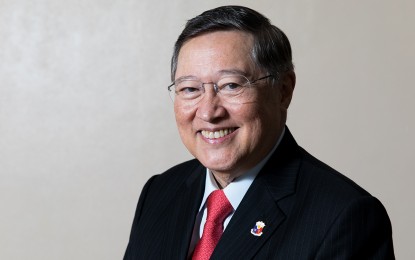
Finance Secretary Carlos Dominguez III
MANILA – Department of Finance (DOF) Secretary Carlos Dominguez III has thanked the Congress for its crucial role in ensuring that the government is financially able to meet the challenges of the crisis spawned by the coronavirus disease 2019 (Covid-19) pandemic with the legislative approval of the Tax Reform for Acceleration and Inclusion Act (TRAIN) and a “conservative” 2020 national budget.
Dominguez said the congressional approval of TRAIN three years ago enabled the government to dramatically raise its revenue collections, while the passage of the 2020 national budget made sure that public funds would be prudently spent on priority and essential programs and projects.
“I think we should look back and see what preparations the Congress allowed us to make, to come out of this Covid crisis, to prepare for it. And that was really the tax reform. I think this is a good example of why tax reform works,” Dominguez said during a recent hearing conducted online by the economic stimulus cluster of the Defeat Covid-19 Committee (DCC) of the House of Representatives.
TRAIN, which was passed by the Congress in 2017, substantially reduced personal income tax (PIT) rates for 99 percent of wage earners, as well as the donor’s and estate taxes.
It also introduced excise taxes on sweetened beverages and raised the taxes on fuel, tobacco products, automobiles and mineral products.
“You (Congress) gave us the ability to: number one, increase our revenues; number two, you gave us the ability -- you approved a budget that was very conservative and that was spent for a really productive enterprise,” Dominguez said.
Given these accomplishments, “Congress is the one that helped the Filipino people be fully prepared for this (Covid) crisis,” he said.
During the hearing held to tackle the proposed Philippine Economic Stimulus Act (PESA), Dominguez also briefly discussed the Duterte’s administration’s four-pillar socioeconomic strategy to blunt the impact of Covid-19 on the Filipino people and the economy, as well as the measures undertaken by the government to help small businesses though wage subsidies, credit guarantees, and longer net operating loss carryover (NOLCO).
Dominguez likewise discussed during the DCC hearing the government's proposed lending program for private schools to encourage them to accept students under a “study now, pay later plan;" and the need for farmers to shift to commercial farming to boost agricultural productivity and boost their incomes.
He said the expanded budgetary powers granted by the Congress to the President under Republic Act 11469, or the Bayanihan To Heal As One Act, a week after the implementation of the enhanced community quarantine (ECQ) has enabled the government to formulate its four-pillar strategy.
This four-pillar strategy, he said, has a combined value so far of USD29.3 billion (PHP1.49 trillion) or about 8 percent of the country’s gross domestic product (GDP).
It covers providing poor and low-income households, small-business employees and other vulnerable groups emergency and wage subsidies; marshaling the country’s medical resources and ensuring the safety of healthcare front-liners; fiscal and monetary actions to finance emergency initiatives and keep the economy afloat; and an economic recovery plan to create jobs and sustain growth under a post-quarantine scenario.
Dominguez said on top of the congressional approval of the budget and TRAIN, President Rodrigo Duterte’s policies of maintaining fiscal discipline and exercising prudence in state spending has made sure the Philippines is “financially able” to bridge the massive funding needed to defeat Covid-19.
The President's judicious spending policies have kept the country’s macroeconomic fundamentals strong, with GDP growth averaging 6.4 percent since he assumed office in 2016, he said.
The government’s revenue effort or collection from taxes and other sources reached 16.9 percent in 2019, which is the highest in 22 years, he added.
Dominguez said the Philippines has also maintained a manageable debt-to-GDP ratio of 41.5 percent in 2019, which is a vast improvement from the 70 percent in the past.
The Philippines’ 2019 debt-to-GDP ratio is also very low compared to other economies in the region, where one country’s debt has crept past 80 percent of its GDP, he said.
Inflation has also remained low at 2.5 percent in March, which is within the 2020 target of 2 to 4 percent, he added. (PR)
